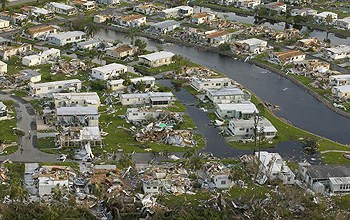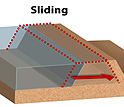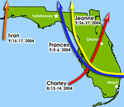News Release 06-138
National Science Board Proposes Major Initiative in Hurricane Science and Engineering

In August 2004, Hurricane Charley tore apart whole communities of homes and businesses in Florida.
September 29, 2006
This material is available primarily for archival purposes. Telephone numbers or other contact information may be out of date; please see current contact information at media contacts.
In 2004, Florida became the first U.S. state in 118 years to be hit squarely by four hurricanes. And in 2005, Hurricane Katrina brushed Florida on the way to her eventual Category Four direct hit on coastal communities in Louisiana and Mississippi, including a devastating blow to New Orleans.
While billions of dollars have been spent on these and other hurricane and tropical storm recovery efforts, the National Science Board has taken note of the continuing and proportionately slower growth of federal research investments toward understanding these catastrophic events and translating research outcomes into practice.
Today, the Science Board proposed a major new research effort as it released a draft report, Hurricane Warning: The Critical Need for a National Hurricane Research Initiative. The draft report, presented at a Capitol Hill news briefing with senators and congressional staffers, urges that relative to the tremendous damage and suffering caused by hurricanes, the federal investment in hurricane science and engineering is insufficient and further states that "time is not on our side."
The report recommends a major increase in federal investments for hurricane research. It states that up to $300 million in additional yearly spending is needed as part of this new multi-agency national research effort. The draft report is now available for public comment for the next 30 days.
Hurricanes and tropical storms that made U.S. landfall from 2001-2005 cost the lives of many citizens and led to losses of private homes and businesses, as well as environmental and property damage, amounting to $179 billion (constant dollars, 2006). The losses alone from four hurricanes and tropical storms that hit Florida and the East in 2004, and from Hurricane Katrina and other storms in 2005, were estimated to be at least $168 billion (constant dollars).
"This is a critical area for national policy that requires a focused research effort to address the destructive social, economic and physical infrastructure impacts of hurricanes," said Steven C. Beering, National Science Board chairman.
The draft report says that the overall economic costs associated with hurricanes striking the mainland are growing at a much higher rate than the investments made in creating and generating new knowledge about these kinds of storms. The report also indicates that more focused and coordinated use of research funds could serve to reduce large emergency public outlays and avoid such loss of life and social disruption generated by such catastrophic events.
Kenneth M. Ford, co-chairman of the Science Board task force charged with studying the need for an expanded hurricane science and engineering research agenda, said the new report recommends essential new investments in: prediction of hurricanes in order to improve warnings to local officials and the general population; research toward new construction and infrastructure technologies; and understanding in greater detail the social and economic implications associated with these storms to provide better assistance to affected populations.
Ford, who directs the Institute for Human and Machine Cognition in Pensacola, Fla., stated that the Science Board's recommended initiative will go far to "predict, mitigate and respond to the effects of hurricanes."
"In 2004, Florida was subjected to four major hurricanes--Charley, Frances, Ivan and Jeanne," Ford said. "Those storms damaged or destroyed nearly one-fifth of Florida's homes and killed more than 100 people. So this National Hurricane Research Initiative is needed, and it should be a focused, sustained and multi-agency undertaking."
In September 2005, a Board ad hoc task group recommended the formation of a Task Force on Hurricane Science and Engineering to evaluate the need for a more broad and integrated research effort on hurricanes. Its charge was to: assess current understanding of these events; recommend how to address deep fundamental scientific questions; and recommend research priorities and an agenda that would cut across federal and other research organizations. Over the past 10 months, the task force conducted three public workshops and a host of other discussions with experts leading toward its recommendations in the draft report released today.
"We learned, for example, that a need exists to better understand the complex societal and economic impacts of hurricanes, including information dissemination before landfall, short and long-term economic impacts and the delivery of assistance to people affected by hurricanes," said Kelvin K. Droegemeier, a University of Oklahoma Regents' professor of meteorology and co-chairman of the Board task force.
"We need to know more about the effect of wind and water on levees, buildings and critical infrastructure, making it more resistant to damage and more accommodating to reconstruction. They key to this initiative is studying the hurricane in an integrative manner that cuts across disciplinary and organizational boundaries and stimulates the application of new knowledge in tangible ways," he added.
Droegemeier, who also is Associate Vice President for Research and Weathernews Chair, said that the National Science Foundation (NSF), the National Oceanic and Atmospheric Administration (NOAA) and the National Aeronautics and Space Administration (NASA) should be considered to co-lead the new hurricane research initiative.
"The initiative should also serve to create an interdisciplinary hurricane research community of experts internationally," Droegemeier said. He also said the report is proposing a National Hurricane Research Test Bed where science and engineering disciplines would come together to test new ideas in end-to-end systems and facilitate transfer of results to operations. The report also recommended creating a National Infrastructure Data Base that will help facilitate research, provide a baseline for developing standards and serve as a resource for public policy makers.
The draft report may be found at: http://www.nsf.gov/nsb/committees/hurricane/index.htm
The Science Board is an independent 24-member body of policy advisors to the President and Congress on matters of science and engineering research, and is the policy making and oversight body for NSF, an independent federal agency that supports almost all areas of fundamental research nationwide.
-NSF-
-
Rising water caused the 17th St. levee to slide along different layers of soil under the wall.
Credit and Larger Version -
In 2004, Florida became the first state in 118 years to be hit by four major hurricanes.
Credit and Larger Version
Media Contacts
Bill Noxon, (NSB), (540) 672-6656, email: bnoxon@hughes.net
Program Contacts
Jean Pomeroy, NSF, (703) 292-7000, email: jpomeroy@nsf.gov
The U.S. National Science Foundation propels the nation forward by advancing fundamental research in all fields of science and engineering. NSF supports research and people by providing facilities, instruments and funding to support their ingenuity and sustain the U.S. as a global leader in research and innovation. With a fiscal year 2023 budget of $9.5 billion, NSF funds reach all 50 states through grants to nearly 2,000 colleges, universities and institutions. Each year, NSF receives more than 40,000 competitive proposals and makes about 11,000 new awards. Those awards include support for cooperative research with industry, Arctic and Antarctic research and operations, and U.S. participation in international scientific efforts.
Connect with us online
NSF website: nsf.gov
NSF News: nsf.gov/news
For News Media: nsf.gov/news/newsroom
Statistics: nsf.gov/statistics/
Awards database: nsf.gov/awardsearch/
Follow us on social
Twitter: twitter.com/NSF
Facebook: facebook.com/US.NSF
Instagram: instagram.com/nsfgov




